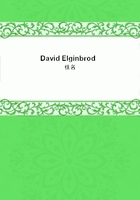
第87章
"Oh! of course," replied Mr. Arnold; "quite right. What, then, pray, is biology?""A science, falsely so called," said Hugh, who, waking up a little, wanted to join in the conversation.
"What does the word mean?" said Mr. Arnold.
Von Funkelstein answered at once:
"The science of life. But I must say, the name, as now applied, is no indication of the thing signified.""How, then, is a gentleman to know what it is?" said Mr. Arnold, half pettishly, and forgetting that his knowledge had not extended even to the interpretation of the name.
"It is one of the sciences, true or false, connected with animal magnetism.""Bah!" exclaimed Mr. Arnold, rather rudely.
"You would have said so, if you had heard the lecture," said Funkelstein.
The conversation had not taken this turn till quite late in the dining ceremony. Euphra rose to go; and Hugh remarked that her face was dreadfully pale. But she walked steadily out of the room.
This interrupted the course of the talk, and the subject was not resumed. Immediately after tea, which was served very soon, Funkelstein took his leave of the ladies.
"We shall be glad to see you often while in this neighbourhood,"said Mr. Arnold, as he bade him good night.
"I shall, without fail, do myself the honour of calling again soon,"replied he, and bowed himself out.
Lady Emily, evidently relieved by his departure, rose, and, approaching Euphra, said, in a sweet coaxing tone, which even she could hardly have resisted:
"Dear Miss Cameron, you promised to sing, for me in particular, some evening. May I claim the fulfilment of your promise?"Euphra had recovered her complexion, and she too seemed to Hugh to be relieved by the departure of Funkelstein.
"Certainly," she answered, rising at once. "What shall I sing?"Hugh was all ear now.
"Something sacred, if you please."
Euphra hesitated, but not long.
"Shall I sing Mozart's Agnus Dei, then?"
Lady Emily hesitated in her turn.
"I should prefer something else. I don't approve of singing popish music, however beautiful it may be.""Well, what shall it be?"
"Something of Handel or Mendelssohn, please. Do you sing, 'I know that my Redeemer liveth?'""I daresay I can sing it," replied Euphra, with some petulance; and went to the piano.
This was a favourite air with Hugh; and he placed himself so as to see the singer without being seen himself, and to lose no slightest modulation of her voice. But what was his disappointment to find that oratorio-music was just what Euphra was incapable of! No doubt she sang it quite correctly; but there was no religion in it. Not a single tone worshipped or rejoiced. The quality of sound necessary to express the feeling and thought of the composer was lacking: the palace of sound was all right constructed, but of wrong material.
Euphra, however, was quite unconscious of failure. She did not care for the music; but she attributed her lack of interest in it to the music itself, never dreaming that, in fact, she had never really heard it, having no inner ear for its deeper harmonies. As soon as she had finished, Lady Emily thanked her, but did not praise her more than by saying:
"I wish I had a voice like yours, Miss Cameron.""I daresay you have a better of your own," said Euphra, falsely.
Lady Emily laughed.
"It is the poorest little voice you ever heard; yet I confess I am glad, for my own sake, that I have even that. What should I do if Inever heard Handel!"
Every simple mind has a little well of beauty somewhere in its precincts, which flows and warbles, even when the owner is unheedful. The religion of Lady Emily had led her into a region far beyond the reach of her intellect, in which there sprang a constant fountain of sacred song. To it she owed her highest moods.
"Then Handel is your musician?" said Euphra. "You should not have put me to such a test. It was very unfair of you, Lady Emily."Lady Emily laughed, as if quite amused at the idea of having done Euphra any wrong. Euphra added:
"You must sing now, Lady Emily. You cannot refuse, after the admission you have just made.""I confess it is only fair; but I warn you to expect nothing."She took her place at the piano, and sang--He shall feed his flock.
Her health had improved so much during her sojourn at Arnstead, that, when she began to sing, the quantity of her voice surprised herself; but after all, it was a poor voice; and the execution, if clear of any great faults, made no other pretence to merit. Yet she effected the end of the music, the very result which every musician would most desire, wherein Euphra had failed utterly. This was worthy of note, and Hugh was not even yet too blind to perceive it.